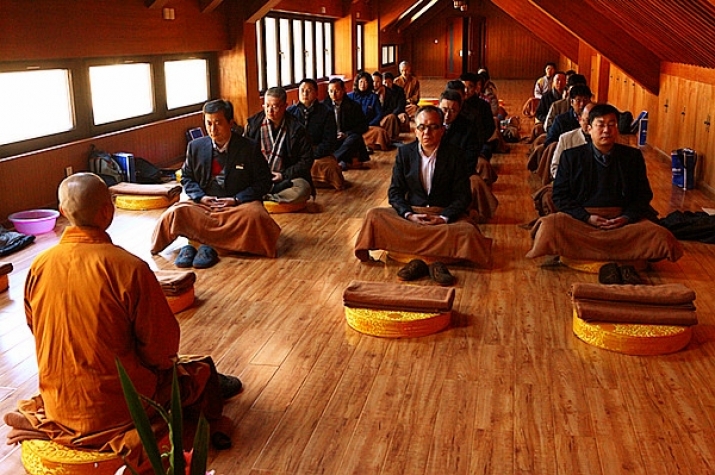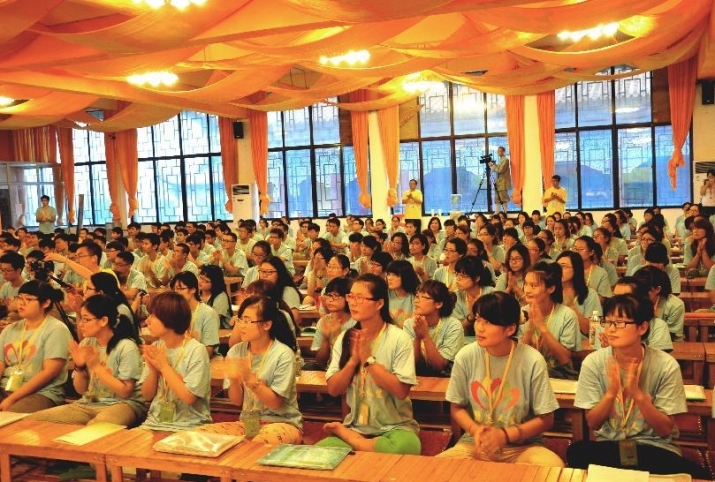NEWS
Buddhist Temples in China Experience a Surge in Spiritual Seekers
 Laypeople attend a meditation retreat in Hangzhou, in China's eastern Zhejiang Province. From mildchina.com
Laypeople attend a meditation retreat in Hangzhou, in China's eastern Zhejiang Province. From mildchina.comBuddhist temples in China are experiencing a boom in demand for meditation retreats as a growing number of people seek spiritual solace and meaning in their lives. Analysts in China attribute the phenomenon to the frenetic pace of modern life, observing that Buddhist retreats offer an opportunity for inner reflection to fill the spiritual void many in the country feel after three decades of breakneck economic transformation.
“As the economy develops, more people can satisfy their material needs but they face new problems with life,” said Professor Li Lian, director of the Buddhist Research Centre at Northwest University in Xi’an, capital of the central province of Shaanxi. “Many feel lost when they try to find the meaning and value of life.” (South China Morning Post)
Li predicted a promising future for Buddhism in China, no longer constrained by the communist ideology that fueled the Cultural Revolution, when thousands of temples across the country were destroyed and many Buddhists persecuted.
Staff at Donghua Zen Temple in southern Guangdong Province said demand was such that hundreds of applications are received for the 40 openings at its monthly seven-day retreats, which are reserved for women on odd-numbered months and men on others. “People who come to our temple are mostly white-collar workers, business executives, and believers,” said a temple volunteer.
Lin, a university professor in southern China, was one such eager applicant, waiting two months to attend a retreat at the temple. She joined more than 30 women from across the country in severing all contact with the outside world for one week—rising at about 4 a.m. and spending the day in contemplation, walking around a Buddhist statue, and listening to talks, until 8 p.m.
Lin said the hours of seated meditation had proved physically challenging, even painful, but she left the retreat feeling elated. “I learned a lot from my retreat experience. I know how to correctly meditate and have a deeper understanding of life and the universe,” she reported. “Before the retreat, I was not happy with my job, thinking I wasn’t paid enough and couldn’t find my value at work. But now I have a belief that I live to help other people. . . . With everything I do, I can benefit other people.” (South China Morning Post)
 College students on a summer Buddhist retreat at Zhengjue Temple in Boshan, in the eastern province of Shandong. Photo by Wang Jixiao. From news.xinhua.net
College students on a summer Buddhist retreat at Zhengjue Temple in Boshan, in the eastern province of Shandong. Photo by Wang Jixiao. From news.xinhua.netOther temples are also opening their doors to laypeople seeking spiritual respite, even for just a weekend. While most of the retreats are free, a few temples do expect a monetary contribution. Yufo Temple in Shanghai, which held its first seven-day retreat for 108 people in October, charged 2,000 yuan (US$308) per person. Temple employee Wang Hui said all the spots were filled within a week.
Zhang Zong, a researcher on Buddhism at the Chinese Academy of Social Sciences, said Buddhist retreats offered much greater benefit to participants than simply reading an inspirational book. “Meditation is done under the instruction of Buddhist masters, who are key to the whole experience,” he said, adding, “The construction of Buddhist temples and the popularity of Buddhist retreats all reflect the revival of Buddhism in China.” (South China Morning Post)
Estimates for 2010 by the Washington, DC-based Pew Research Center put the number of Buddhists in China at more than 244 million—the majority of whom practice Mahayana Buddhism—representing 18.2 per cent of the country’s population and half the total number of Buddhists worldwide.
See more
Now and Zen: China’s Buddhist temples open doors to modern mainland soul-searchers (South China Morning Post)
China (Pew-Templeton Global Religious Futures Project)














